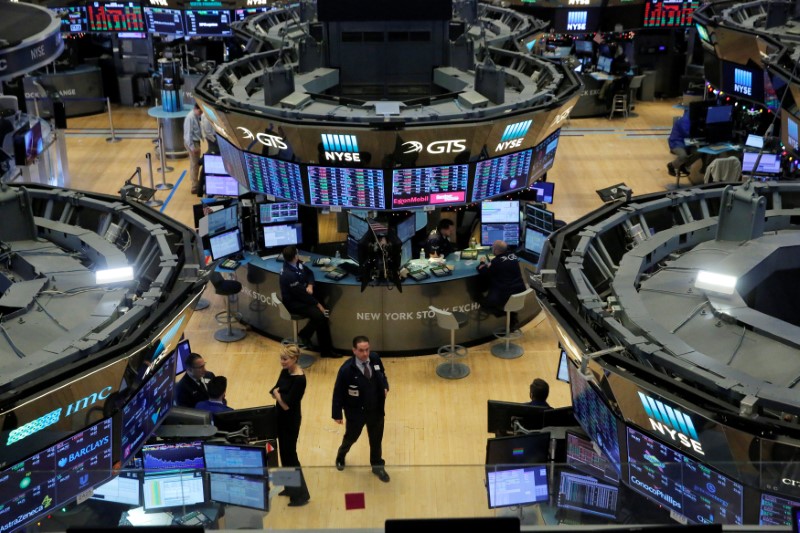By Sinead Carew
NEW YORK (Reuters) - Wall Street's major stock indexes pared earlier losses on Wednesday while U.S. Treasury yields fell from their peak as investor skepticism grew about a report that China would slow purchases of U.S. government bonds.
Financial stocks were still the biggest percentage gainers by late afternoon, however, as investors reacted to the Bloomberg report on China, the world's biggest holder of U.S. Treasuries.
The S&P 500 pared some losses after falling as much as 0.6 percent after the report, which also pushed the dollar down.
"As the day wore on, Treasury yields started to move lower on the realization the story doesn't have any legs. That's definitely helped equities. There's no way on earth the Chinese stop buying U.S. Treasuries," said Robert Pavlik, chief investment strategist, SlateStone Wealth in New York.
The S&P also dipped on a Reuters report saying Canada is increasingly convinced President Donald Trump will soon announce the United States intends to pull out of the North American Free Trade Agreement. The report cited two unnamed government sources.
At 2:47 p.m. (1947 GMT), the Dow Jones Industrial Average (DJI) was down 30 points, or 0.12 percent, to 25,355.8, the S&P 500 (SPX) had lost 6.01 points, or 0.22 percent, to 2,745.28 and the Nasdaq Composite (IXIC) had dropped 25.29 points, or 0.35 percent, to 7,138.29.
The China report put the S&P and the Nasdaq on track to snap a six-day run of record closing highs as investors worried that the market was overdue for a correction.
"It's a reflection of investor weariness and awareness that the market has risen for four straight months without seeing a major pullback," said Pavlik. "They're on alert in case something develops."
The S&P financial index (SPSY) was last up 0.8 percent, helped by gains in Wells Fargo (N:WFC), Berkshire Hathaway (N:BRKa) and JPMorgan (N:JPM).
Banks and insurance companies often rise with bond yields as investors expect a profit boost from higher interest rates.
Rate-sensitive sectors such as utilities (SPLRCU) and real estate <.SPLRCREC> were the biggest percentage losers of the S&P's 11 major sectors.
The China report weakened the dollar (DXY), which was last down 0.2 percent, while safe-haven commodity gold
Investors started the New year optimistic about global growth prospects and with high expectations for a strong U.S. quarterly earnings season which kicks off on Friday with reports from big banks.
Earnings for S&P 500 companies are expected to increase by 11.8 percent, with the biggest contribution from the energy sector, according to Thomson Reuters I/B/E/S.
Berkshire Hathaway (N:BRKb) rose 1.2 percent after the conglomerate promoted two top executives, cementing their status as the most likely successors to Warren Buffett.
Shares of Lennar Corp (N:LEN) gained 2 percent as No.2 U.S. homebuilder's orders and total revenue rose more than expected in the fourth quarter.
The Dow Jones Transport index (DJT), often seen as a gauge of the economy's health, pared its gains and was last up 0.1 percent after climbing as much as 0.7 percent following United Continental's (N:UAL) report of higher traffic for December.
Department store operator Kohl's (N:KSS) rose about 3.2 percent after two brokerages raised their price targets.
Declining issues outnumbered advancing ones on the NYSE by a 1.72-to-1 ratio; on Nasdaq, a 1.18-to-1 ratio favored decliners.

The S&P 500 posted 74 new 52-week highs and seven new lows; the Nasdaq Composite recorded 90 new highs and 23 new lows.